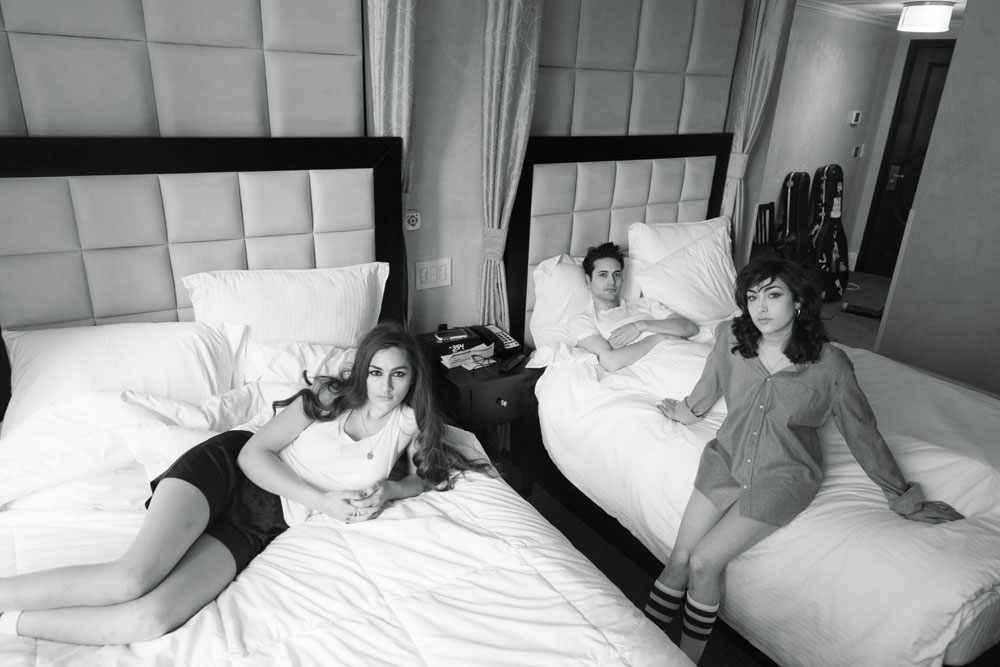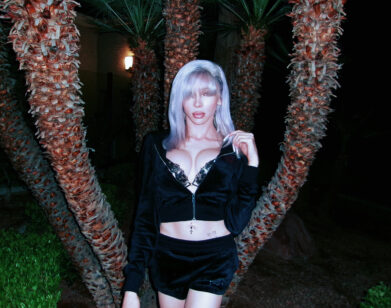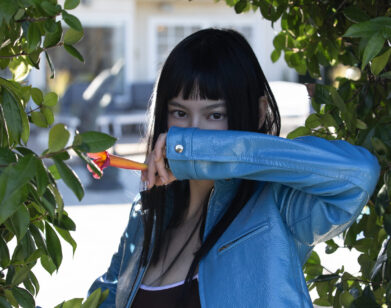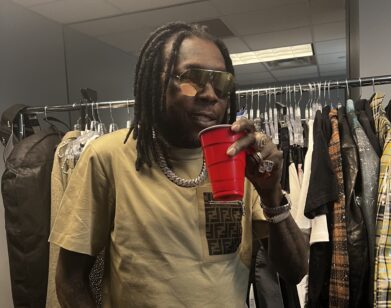Exclusive Album Stream: ‘The Third,’ Kitty, Daisy & Lewis
KITTY, DAISY, AND LEWIS DURHAM IN NEW YORK, FEBRUARY 2015. PHOTOS BY JUSTICE APPLE. STYLING BY JESSI JACQ. MAKEUP: JUNKO KIOKA/JOE MANAGEMENT. HAIR: LAURA DELEON/JOE MANAGEMENT.
Creating an appealing post-modern rockabilly sound for the Camden Town crowd may seem like a challenge, but the London-based siblings Kitty, Daisy, and Lewis Durham make it appear effortless. For their latest album, The Third, which is exclusively streaming below, the trio molded a nostalgia-soaked menagerie of tunes with country, jazz, blues, and straight rock- ‘n’-roll melodies. The mod album opener, “Whenever You See Me,” provides a punchy, riot grrrl-esque ode to female empowerment; “Good Looking Woman” evokes the ’50s era Ray Charles songbook; and the horn-heavy “Turkish Delight” is infused with equal parts ska and jazz.
Ever since they can remember, the Durham siblings have been jamming together, due in part to their lineage—their mother, Ingrid Weiss, formerly drummed for The Raincoats, and their father, Graeme Durham, is a guitarist and engineer at The Exchange, one of London’s top recording studios. Each of them can sing and they’re all multi-instrumentalists, collectively playing the guitar, banjo, lapsteel guitar, harmonica, piano, xylophone, accordion, double bass, ukulele, drums, and trombone. With The Clash’s Mick Jones as their producer and mentor, the trio wrote and recorded The Third at an Indian restaurant-turned-studio over three years, resulting in a harmonious juxtaposition of both heartening and unnerving themes.
“With the songwriting, we’ve grown up a lot since the last album, in terms of experiences and different relationships,” Kitty explains. “The songs are a lot more personal to us.”
Last month, we spoke with the band while they were in Manhattan.
DEVON IVIE: How long have you all been playing together?
LEWIS DURHAM: We started when we were kids, because our dad used to sing and play guitar in the house. There was always music. We had a piano and a guitar, like the old-fashioned way people use to play music, sitting at home. My dad came from a big family in India where they did the same, so he was just doing what he did as a kid. My mom was into music, too. When the extended family came over, everyone would bring guitars. We used to go down to a pub when we were kids—they had music every Sunday afternoon—and the owner said, “Do you want to come up and play a few songs?” So we thought, “Well, okay.” We did it and that was that. Then someone else asked us to come and play. It was all by accident.
IVIE: What was it that made you all gravitate towards this eclectic, country-jazz-blues sound?
LEWIS DURHAM: When you’re singing a song with a guitar, and singing old classic songs, that’s a usual cliché. For us, it wasn’t about genres, because when you’re a kid you don’t really know about genres; you just know what you hear. We would hear songs and we would sing them. It was only later when people would say, “Oh, that’s blues” or “Oh, that’s country,” and we would be like, “I don’t know! That’s what we play!” It was really organic, the kind of music we heard.
IVIE: What specifically inspires you from the 1940s and 1950s?
LEWIS DURHAM: The thing is, we’re not really. When we were small kids we used to wear old clothes, but we really grew up with all kinds of records. My mother would have Gary Glitter records and T. Rex records and Stevie Wonder records, so we grew up with every other kind of music as much as the older types. And at school, too, we had the music of the day and the radio. Our latest record shows more of those influences. We’re not just inspired by certain decades; we pick from different eras and music we like. We listen to everything and anything. Anything is good.
IVIE: How did you connect with Mick Jones to produce the album?
KITTY DURHAM: We knew him from here and there around London. When we were thinking about getting a producer for the album, our manager said, “Why don’t you approach Mick Jones and see if he’s up for doing it?” We thought it was an interesting idea. Lewis bumped into him at the Notting Hill Carnival in London and was like, “Want to come around, play some music, and maybe produce a record?” At that point we thought maybe he’d just do one or two songs, but he was really up to it and said of course. He came around, brought his guitar, and for about five months he rehearsed with us in our mom’s back room. He was learning the songs and writing them down in his little book. He really got to know the songs really well. It helped us because we were really rehearsed by the time we got into the studio. That’s how it started.
IVIE: I love the work that he did with the Libertines. It’s awesome that he was your producer.
KITTY DURHAM: Oh yeah. He’s really fun and laid-back. When we get together it’s like he’s a member of the family. He’ll come around, have a cup of tea, talk some bullshit. [laughs] It’s good fun.
IVIE: And you recorded the album in what was once a derelict Indian restaurant?
KITTY DURHAM: Yeah. We got the place and it took us three years to get it into a state that we could get in and start building a studio. It had been derelict for 15 years. They left everything behind. Everything was rotting—there was food and freezers and cookers. It was really disgusting. There were boxes and pigeon shit everywhere, and rats, and god knows what. It took us a long time to clear that out while we were rehearsing at home. That’s why it took so long to get this record out! It was fun doing it, but it took a long time.
IVIE: How would you define the Kitty, Daisy & Lewis sound?
KITTY DURHAM: A mix of everything, all kinds of genres. They all roll into one because we do it our own way. When we write a song, we’re not thinking that we have to do it in this style or genre; it just comes out. And obviously because we play instruments differently from each other, we have our own little special things that we do. Like, Daisy will play a few chords from a piano, Lewis will play something on the drums, I’ll sing a funky line, and then we don’t know what it’s going to end up being. We’ll throw everything in there and see what happens.
IVIE: What’s your creative process like for making a song? Is there a go-to lyrics person, a go-to melody person, or is it a complete free for all?
DAISY DURHAM: We all write our songs individually. For me personally, a lot of stuff comes to me in my sleep. I’ll wake up and there’ll be a word going through my head or a melody. It’s usually negative stuff; I find it easier to write negative songs. [laughs] So we’ll come up with a song on our own, show the rest of the band in a rehearsal, and if you wrote the song, you know you’re going to sing it. We all know our own styles, so it happens naturally that way, through jamming. Sometimes you’ll start off and not feel the groove, then someone will switch over to another instrument and play something completely different, and then it’ll fall into place. So, for writing, it’s definitely a separate part. It’s how we develop it in a room together that gives it the Kitty, Daisy & Lewis spirit.
IVIE: Who have been some of the biggest musical influences throughout your lives?
DAISY DURHAM: That’s a hard question since we have so many influences. Instead of naming bands, I’ll say our dad and mom. They’re the ones who brought the music to us. We never really thought of ourselves as musicians; it’s something that we did for fun at home. Our parents are the biggest influences. In terms of bands, we grew up with the typical stuff—Elvis Presley, [but also] obscure ’60s and ’70s records, which is the stuff I like the most. [laughs]. I love The Kinks and T. Rex and stuff like that, which I think is more apparent in our album.
IVIE: How would you say your music has evolved from your earlier years?
DAISY DURHAM: I think at home we still do exactly the same things we’ve always done. We’d get back from the pub and start singing the same songs. But now we’ve added more into the mix. Our songwriting has changed and improved as we’ve grown up. I think we’re more confident. We’re not keeping everything so simple. If we want to try something different, there’s nothing stopping us.
Before, it was very three-chord bass-y and every song was about love. Now, particularly for me, I’m not scared to write about other things. Rock it up a bit and put some disco elements in there. We had a cassette tape when we were kids, ABBA’s Gold, which we listened to in the car all the time. No one would really think that it’s the kind of thing we’re into, listening to the first two albums, but on this album you start to hear those elements.
THE THIRD WILL BE RELEASED IN THE U.S. NEXT TUESDAY, MARCH 31, VIA SUNDAY BEST. FOR MORE ON KITTY, DAISY & LEWIS, VISIT THEIR WEBSITE.







